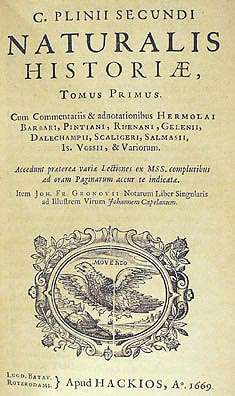Natural History

Natural History is an encyclopedia of sorts written by Pliny the Elder, a Roman writer and naval commander who was born in 23 A.D., and died in 79 A.D. of a heart attack while journeying to Pompeii to rescue relatives living there. Natural History is probably the Ur Example of the Great Big Book of Everything, predating Isidore of Seville's Etymologies by 421 years.
Like Etymologies, the point of Natural History was to document all information which was known about the world at the time. However, in hindsight, while quite a bit of the information is accurate, such as amber conducting electricity, there are also quite a few instances of Urban Legends of the time and exaggerations, resulting in quite a few unintentional instances of Critical Research Failure by modern standards.
A translation from 1861 can be found here.
- Cephalothorax: The Blemmyae.
- Epistolary Novel: The book's preface takes the form a long letter written by Pliny to his friend, Emperor Vespasian. (pages 13-25)
- Flat World: Subverted, Pliny states that the earth is not a sphere, but that the world's shape is fluid. (page 31)
- Floating Continent: He dedicates the entirety of chapter XCV (page 130) to the subject of portions of land which float from place to place aimlessly.
- Great Big Omnibus of Everything: A collection of 37 Books, covering zoology, medicine, geography, astronomy, anthropology, botany, agriculture, metallurgy, mineralogy, art history, pharmacology, meteorology, ethnography, and human physiology.
- Human Subspecies: Various... ...bizarre tribes of Human are discussed. Like the Sciapods, who have only one leg, and whose feet are so large that they use them as parasols when lying down; the Blemmyae, who are headless and have their faces on their torsos, and the Astomi, who have no mouths, and live off of scents and smells.
- I'm a Humanitarian: The Anthropophagi.
- Info Dump: The sections on Geography rattle off swiftly the locations and layout of various nations and provinces of the world.
- Mother Earth: Pliny documents the (then-contemporary) phenomenon among his peers of referring to the earth as female, and terming it "mother". (pages 99-100).
- Meaningful Name: Anthropophagus in Latin literally means "man-eater".
- Truth in Television: Many instances, as this is an encyclopedia, and thus meant to be factual; but a particularly weird example is in chapter XCVIII (page 135), "Wonders of the Sea". "About Messala and Nylæ, there is thrown upon the Shore Dregs like Beasts' Dung". This makes too much sense when you consider that the dung of parrotfish disintegrates into sand when it reaches the seashore.
- Turtle Island: Pristis, a fish so large that sailors frequently mistake its back for an island.